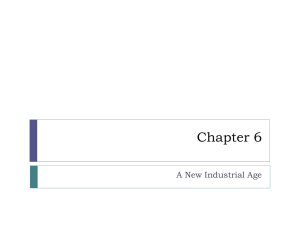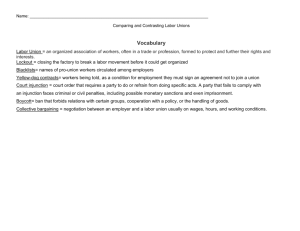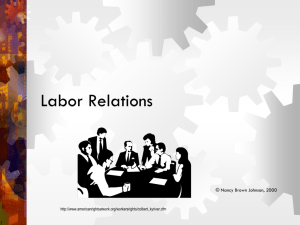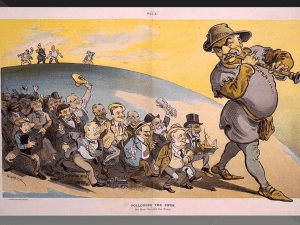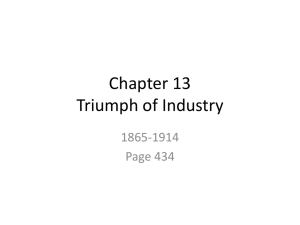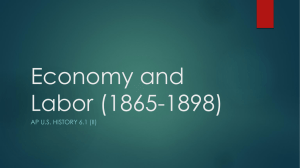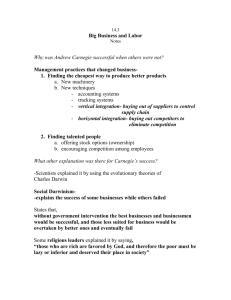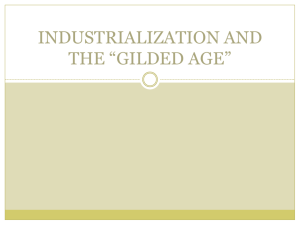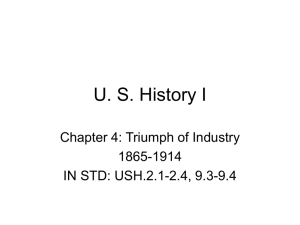Chapter 13
advertisement
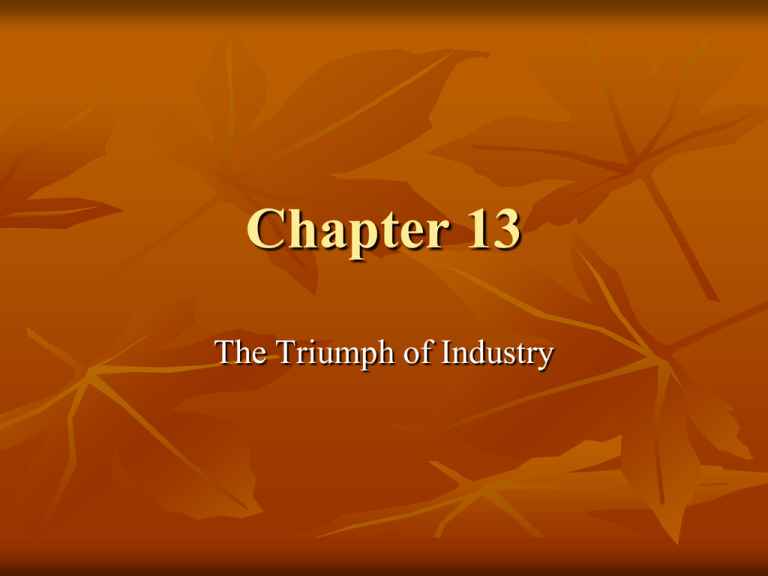
Chapter 13 The Triumph of Industry Introduction What impact does a war have on industry and technology? What specific impact did industry have on the Civil War? http://www.history.com/videos/the-industrialrevolition 1. Technology and Industry Post Civil War Rapid industrial growth Railroads expanded Natural resources helped Coal – steam power Lumber Rivers for shipping Edwin Drake – first oil well (whales previously) Workforce grows New surge in immigration from Europe and Asia Large and willing work force to fuel industry Technology & Industry cont. Growth of capitalism Laissez faire – govt. stays out of business Horatio Alger - “rags to riches” idea; the American dream Entrepreneurship – invest money to make a profit; creates jobs Protective tariffs Innovation Electricity transforms life Communication Thomas Edison – light bulb 1,000 patents (grant giving exclusive rights to develop and sell for a limited time) Samuel F.B. Morse – telegraph Alexander Graham Bell – telephone Steel Henry Bessemer – Bessemer Process Purified iron ore to create lightweight, strong steel Suspension bridges held by steel cables (Brooklyn Bridge) Westinghouse – air brakes; electricity over long distances Swift – refrigeration cars (meat) Innovation cont. The nation is linked by railroads Adopted 24 time zones for scheduling Streetcars, subways, commuter rails appear Mass production Growing link in world markets Everything becomes mechanized Impacts the environment http://www.history.com/shows/modernmarvels/videos/the-telegraph-and-telephone http://www.history.com/shows/modernmarvels/videos/light-bulb-turns-night-into-day 2. Rise of Big Business Most businesses privately owned – limited capital Desire for profits, expansion, access to transportation leads to corporations Many people share ownership Huge amounts of capital for research, technology, reinvestment Board of directors, some shareholders receive dividends (payments) Big Business cont. J.P Morgan – banking Cornelius Vanderbilt – steamboats then railroads John D. Rockefeller – oil Andrew Carnegie – steel Some became monopolies where they bought out competition or drove them out of business Cartel – people in same business agree on production to keep prices high Trust – put business in other names or smaller companies http://www.history.com/videos/john-drockefeller-oil-money-and-power Corporate Giants – How? Horizontal Integration Consolidate (buy) many smaller companies in the same business Rockefeller - bought small oil companies Vertical Integration Control all parts of the production process Rockefeller did this also – controlled oil wells, pipelines, retail outlets, etc. Standard Oil Debating the Giants Captains of Industry or Robber Barons? Robber barons Captains of industry Unfairly kept high prices, paid workers little, stifled competition, swindled the poor Increased labor force, stimulated the economy, technology benefited all, shaped the U.S. into strong industrial power Most men were philanthropists and donated millions Giants cont. Social Darwinism develops out of Charles Darwin’s theory of evolution and natural selection: “survival of the fittest” Applied this theory to capitalism The rich were the best because they earned it The most rigorous and productive rise to the top Reluctant to help poor – they were unfit Government should stay out of it Regulations ICC – Interstate Commerce Commission – first federal body set up to monitor business Regulated railroads Long history of price fixing, unfair rates, etc. Sherman Antitrust Act – Outlawed any trust that operated “in restraint of trade or commerce among the states.” Both seldom enforced but at least an attempt Factories Immigrants made up large % of work force Long hours – 12-16 hours, 6 days/week Sweatshops – small, hot, dirty workplaces Many women & children employed – 1 in 5 children worked rather than attend school – stunted physical and emotional growth – lost childhood Strict regulation of employees Dangerous – hearing loss from noise, accidents from faulty equipment, poor ventilation Child labor http://www.history.com/videos/the-fight-to-end-childlabor 3. Organized Labor Pros of industrial expansion: Economy grew drastically, great wealth for industrialists, higher standards of living, availability of goods, access to public institutions (schools, museums) Cons of industrial expansion: People who worked in factories struggled to survive, immigrant workers faced discrimination Labor Unions Form Early attempts – collective bargaining – group negotiates for better wages, conditions Socialism spreads in Europe 1830’s Favors public (not private) control of property and industry 1848 – Karl Marx, Friedrich Engels Communist Manifesto – denounced capitalism and predicted workers would overthrow owners Labor activists borrowed from these ideas Labor Unions cont. Knights of Labor – created for all workers of any trade, skilled or unskilled Terrence Powderly took over, encouraged boycotts Unsuccessful strikes led to its demise AFL – American Federation of Labor founded by Samuel Gompers Craft union of skilled workers Required dues Sought wages, working conditions, better hours Opposed women – feared they would drive wages low Strikes Railroad strikes – caused destruction of property, militias called in to protect temporary workers, federal troops sent to stop strikers Haymarket Square – wanted 8 hour workday, violence began, bomb killed policemen, several others killed Knights of Labor died as people shied away from radicalism; employers associated unions now with violence Strikes cont. Homestead Strike - Carnegie cuts wages at steel plant; partner (Frick) hired Pinkerton agency, killed several Workers ended strike but led to epidemic of other strikes Pullman Strike – railway car workers required to live in company towns, wages cut; Eugene V. Debs organizes strike – shut down railroads, mail delivery President Cleveland says strike interferes with free trade, sends troops; Debs arrested *Used Sherman Anti Trust Act against WORKERS! http://www.history.com/videos/andrewcarnegie-and-the-homestead-strike http://www.history.com/videos/jp-morganbattles-coal-miners-in-1902 Impact of Labor Unions Frequent use of troops citing “interference with trade” Trend of contract negotiations & strikes Splits within the union – radical, moderate Mistrust and fear of labor; conflicts
